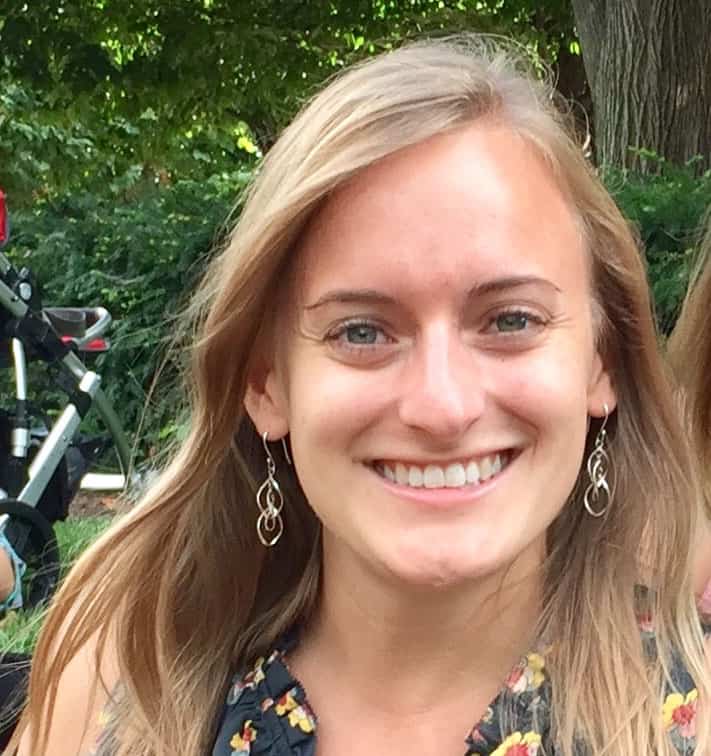Where Are They Now: Jenny Miller (’14)

by Office of Sustainability Staff Writer Suzy Mullins (’18)
From a very young age, Wake Forest alumna Jenny Miller knew she had a passion for the environment. Growing up on a tree farm in southwestern Virginia, she spent most of her early years exploring the countryside, observing animals in their natural habitat, and marveling at the miracles of nature. Over the course of her lifetime, Jenny reflects on how the environment has changed in ways she never could have imagined as a child. “Witnessing this degradation motivated me to work in a sustainability field,” says Miller. “I want to protect the environment I grew to love so that future generations can experience its wonder in the years to come.”
Q: How did your Wake Forest education prepare you for where you are now?
A: My liberal arts education at Wake Forest exposed me to new fields of information, challenged me to think creatively, and allowed me the opportunity to engage with people who I might not otherwise have met. The interdisciplinary nature of my experience proved essential post-graduation, as it prepared me for the winding road that would lead me to the job I have today.
The path toward my desired career in conservation proved much bumpier than I originally imagined. After graduating, I held multiple positions—from the manager of the Wake Forest Campus Garden, to working as an assistant for two vice presidents in Washington, DC. Thankfully, my Wake Forest education had taught me to embrace new opportunities, to do the best job I could with the understanding that my work still contributed positively to humanity.
Q: You held two different positions with the Wake Forest Office of Sustainability. What were they, and what did you gain from these experiences?
A: I was first the Manager for the Campus Garden, where I learned how to oversee projects and engage successful teams. Effective oversight involved tracking schedules for planting, watering and harvesting, and ensuring that important resources were always available in order to create a productive garden space. Growing plants and composting are not always activities with which people are comfortable, so I quickly learned how to meet the volunteers at each of their individual levels. After determining their understanding of sustainable agriculture, I planned specific projects which were appropriately engaging for each person; this allowed volunteers to participate in ways which were meaningful to them, yet also productive success of the garden.
As the Special Campaign Coordinator for the Office, I worked with campuses across the Southeast to build momentum for agricultural biodiversity in regional food systems. This effort provided experience in learning how to best tailor and communicate ideas to different constituencies, as well as how to coordinate community groups to bring an idea to fruition. Ultimately, my work as Special Campaign Coordinator culminated in connecting Winston-Salem residents, local entrepreneurs, students, campus professionals, and a special guest—author and environmental activist Dr. Vandana Shiva—for a tree-planting event in the Reynolda Gardens.
Q: You now work as the Sustainable Markets and Finance Associate with Rare, an international conservation organization. What does your job entail?
A: As an Associate for the Sustainable Markets and Finance team at Rare, I liaise with program staff in Colombia, Mexico, Brazil, Indonesia, the Philippines, China, and the United States to align goals and track progress for the local development of sustainable markets projects. These projects include training communities to support behavior change through the provision of technical knowledge and resources for maintaining sustainable watersheds, fisheries and agriculture. We also work to find markets for individuals to sell their sustainable products so that they can support their livelihoods and local economy. Additionally, I develop and manage my department’s budget and provide administrative support by tracking timelines, commitments, travel, and overseeing various team meetings. Finally, I spend time communicating with corporate business partners, financiers, media, policy-makers and stakeholders to build understanding of Rare’s programs.
Q: What is your favorite part about showing up for work each day?
A: My favorite part of showing up to work each day is knowing I’ll positively support communities globally, while achieving personal growth. My work contributes to achieving long-term conservation, dually improving nature and people’s livelihoods, while the talented group at Rare guarantees I’ll continue to learn and absorb useful information for building a better future.
